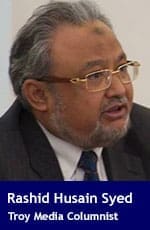 The much-awaited ministerial meeting of the Organization of Petroleum Exporting Countries and its allies, including Russia, in the expanded OPEC+, opted to increase its September output by just 100,000 barrels per day (bpd).
The much-awaited ministerial meeting of the Organization of Petroleum Exporting Countries and its allies, including Russia, in the expanded OPEC+, opted to increase its September output by just 100,000 barrels per day (bpd).
Despite the urgings of U.S. President Joe Biden to open Saudi Arabia’s crude oil taps during his visit there, the announced output increment is sharply lower than the 648,000 bpd OPEC+ earlier announced for July and August.
The Biden administration didn’t criticize the small increase and gave the OPEC+ announcement a positive spin, saying the “OPEC+ oil output increase is a step forward.” But many observers felt the small increment – representing 0.1 percent of the total global crude supply – was a slap in the face to the U.S.
Despite his earlier vows to make Saudi Arabia “a pariah,” Biden opted to go to the oil kingdom to encourage OPEC to produce more and help cool down the markets.
The initiative failed, and the market was swift to react.
“That (the announced OPEC+ output increase) is minuscule, almost imperceptible,” Bob McNally, president of consulting firm Rapidan Energy Group, told CNN. It represents the smallest increase in production on a percentage basis in OPEC history, emphasized McNally. “OPEC+ did the absolute minimum. The market is interpreting this as just short of a rebuff. It’s a purely symbolic gesture.”
Others go even further, describing the OPEC+ move as an insult. “It’s a slap in the face for the Biden administration. This trip and (Biden’s) meeting with MBS (Saudi crown prince Mohammad bin Salman) just didn’t work,” Matt Smith, lead oil analyst for the Americas at Kpler, told CNN.
Robert Yawger, vice-president of energy futures at Mizuho Securities, also described the decision as a slap in the face. “I must say I am surprised they only threw in 100,000 barrels per day.”
The reasons for OPEC’s decision are ample.
Despite the decision, oil markets last week posted their biggest weekly loss since April. That meant markets have shed all the gains made due to Russia’s war on Ukraine.
And the prospects of a global economic slowdown are beginning to hit oil demand.
OPEC+ sees a recession storm on the horizon. The summer driving season is on, but U.S. gasoline consumption is tanking. Americans are driving even less this summer than they were two years ago, during the 2020 pandemic lockdowns. This is stoking demand concerns.
The shift to tighter monetary policy also indicates that economic growth will slow, resulting in crude oil demand shrinking.
Bloomberg reports that China, the world’s largest crude importer, is also showing signs of economic weakness, clouding its outlook for crude consumption. Recent data shows shrinking factory activity, with China Beige Book – which helps institutional investors and corporate CEOs navigate China’s notoriously black box economy – warning that the economy is deteriorating.
In the meantime, few OPEC+ members seem able to meet their export quotas. Saudi Arabia and the United Arab Emirates are the only two countries with spare capacity and they want to maintain that cushion in the event the world faces a winter supply crunch. They vow to be ready to deliver a “significant increase” if necessary, sources told Reuters.
Reuters quoted three anonymous sources as saying that Saudi Arabia and the U.A.E. can produce more crude oil but won’t tap that capacity now. That helps explain the latest OPEC+ output decision.
OPEC oil producers are also aware of Russian reluctance to increase crude output now. Russia isn’t interested in a significant increase reaching the global market. Energy Intelligence Group reported last week that Russia wants prices to stay high, allowing it to keep offering steep discounts for its exports.
The decision to increase output by just 100,000 bpd in September demonstrates that the OPEC+ de facto leaders, Saudi Arabia and Russia, remain aligned in their views on the global market and how it should be managed.
So Biden’s Saudi Arabian visit failed to yield the desired results.
Toronto-based Rashid Husain Syed is a respected energy and political analyst. The Middle East is his area of focus. As well as writing for major local and global newspapers, Rashid is also a regular speaker at major international conferences. He has provided his perspective on global energy issues to the Department of Energy in Washington and the International Energy Agency in Paris.
For interview requests, click here.
The opinions expressed by our columnists and contributors are theirs alone and do not inherently or expressly reflect the views of our publication.
© Troy Media
Troy Media is an editorial content provider to media outlets and its own hosted community news outlets across Canada.


